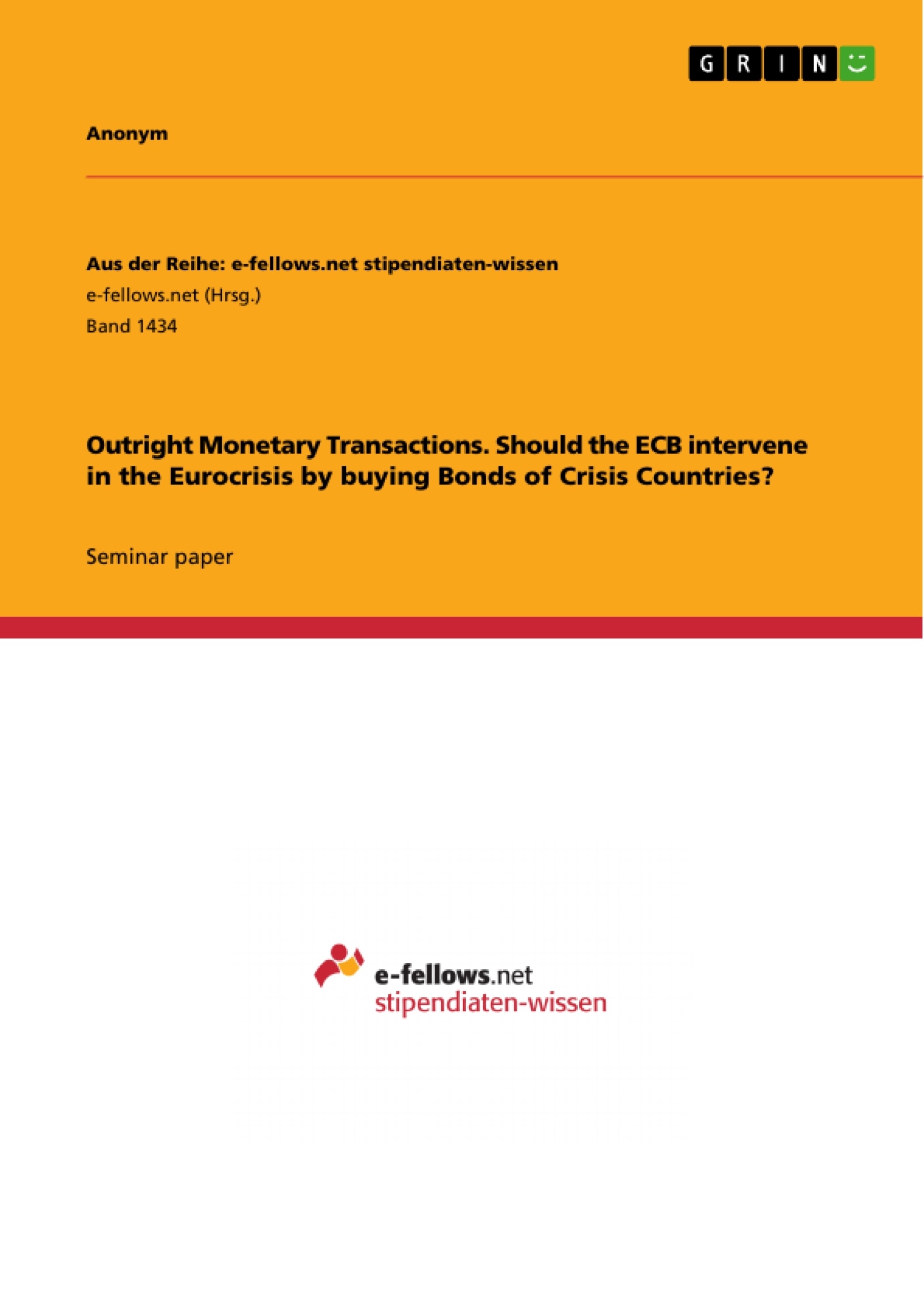“Within our mandate, the ECB is ready to do whatever it takes to preserve the euro. And believe me, it will be enough.” – Mario Draghi, July 2012
In July 2012, at the Global Investment Conference in London, Mario Draghi emphasized the strength and irreversibility of the Euro as single currency of the European Union. At that time the Euro crisis had been facing its greatest challenge, with Portugal, Ireland, Greece and Spain´s heavy indebted balances. Esodic to this crisis have been several occurrences. In 2011, the European Stability Mechanism (ESM) with 500bn euros has been set up, after the four heavily indebted coun-tries did not manage to escape their indebtedness themselves. Accordingly, the yields on their government bonds have risen sharply, as investors demanded huge re-turns to borrow. As a consequence, the countries´ borrowing costs grew proportionately. Together with the stagnation of the economic growth at 0.2%, the downgrading of Italy, France and the European Financial Stability Fund (EFSF) by Standard&Poor´s followed.
In his speech, Mario Draghi announced concrete future actions of the ECB to come, which resulted in Outright Monetary Transactions (OMT). Within OMT, the European Central Bank (ECB) buys government bonds of struggling EU countries on the secondary markets. Therewith, borrowing costs are reduced, easing the burden of decimating budget deficits.
Even though the markets reacted positively, the program is not homogeneously evaluated positively.
In order to gain an overview of issues related to the OMT program, his paper analyzes both the advantages and the risks of an ECB intervention into the European debt crisis by pur-chasing government bonds of crisis countries. Supportively, suitable economic models are applied. The paper closes with a critical reflection.
Inhaltsverzeichnis (Table of Contents)
- Introduction
- Risks of the intervention
- Advantages of the intervention
- Conclusion
Zielsetzung und Themenschwerpunkte (Objectives and Key Themes)
This paper examines the potential risks and advantages of the European Central Bank (ECB) intervening in the European debt crisis by purchasing government bonds of crisis countries. It aims to critically evaluate the Outright Monetary Transactions (OMT) program and its impact on the Eurozone economy.
- The risks and consequences of ECB intervention in the debt crisis
- The potential benefits of OMT for struggling EU member states
- The economic and political implications of the OMT program
- The legal and ethical considerations surrounding ECB intervention
- The potential impact of OMT on the Eurozone's long-term stability
Zusammenfassung der Kapitel (Chapter Summaries)
- Introduction: This chapter provides an overview of the European debt crisis and the ECB's response, introducing the OMT program and its principles. It also discusses the legal challenges surrounding the program.
- Risks of the intervention: This chapter analyzes the potential risks associated with the ECB's intervention, focusing on the impact of austerity measures on weak economies and the potential for moral hazard.
- Advantages of the intervention: This chapter examines the potential benefits of the OMT program, including reducing borrowing costs for crisis countries, fostering confidence in the Eurozone, and promoting economic growth.
Schlüsselwörter (Keywords)
The main keywords and focus topics of this paper are: European debt crisis, European Central Bank (ECB), Outright Monetary Transactions (OMT), Eurozone, government bonds, austerity measures, economic intervention, moral hazard, risk assessment, economic growth, and legal challenges.
Frequently Asked Questions
What are Outright Monetary Transactions (OMT)?
OMT is a program where the European Central Bank (ECB) buys government bonds of struggling Eurozone countries on the secondary markets to reduce their borrowing costs.
What was the context of Mario Draghi's "whatever it takes" speech?
In July 2012, during the peak of the Euro crisis, Draghi committed the ECB to preserving the Euro, which led to the announcement of the OMT program to stabilize the markets.
Which countries were most affected by the debt crisis at that time?
The crisis heavily impacted Portugal, Ireland, Greece, and Spain, all of which faced high indebtedness and rising government bond yields.
What are the primary risks associated with OMT?
Risks include moral hazard (countries relying on ECB support instead of reforms), the negative impact of mandated austerity measures, and potential legal challenges regarding the ECB's mandate.
What are the advantages of ECB intervention?
The intervention aims to lower borrowing costs, restore market confidence in the Euro, and prevent the collapse of the single currency union.
How did the financial markets react to the OMT announcement?
The markets generally reacted positively, as the program provided a safety net that signaled the ECB's determination to support the Eurozone's stability.
- Citation du texte
- Anonym (Auteur), 2015, Outright Monetary Transactions. Should the ECB intervene in the Eurocrisis by buying Bonds of Crisis Countries?, Munich, GRIN Verlag, https://www.grin.com/document/300098



